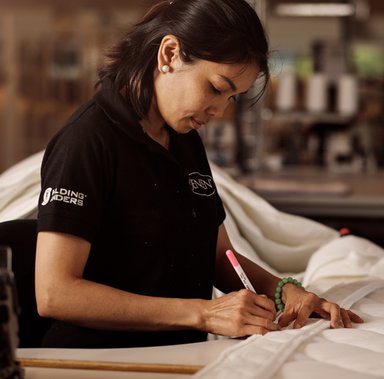The Transparency Act. Jensen’s work related to due diligence in the supply chain
1. General Information
Hilding Anders Norge AS / Jensen beds is part of the Hilding Anders International AB group, which is the largest bed manufacturer in Europe. Jensen is one of the premium brands in the group. Jensen has a turnover of approximately NOK 500 million and 130 employees. Our production includes beds, mattresses and accessories such as headboards, legs, bedside tables, etc. All our products meet strict environmental requirements and are type 1 eco-labelled according to the ISO 14024 standard.
Our customers are B2B in the Nordic region and large parts of Europe, as well as parts of Asia. In addition, we have our own contract collection for the hotel market.
In 2022 we established our own B2C distribution through the Jensen Sleepacy store in Stockholm and to a lesser extent in Svelvik.
2. Policies and procedures
The Transparency Act came into force on July 1st 2022. The purpose of the Act is to promote companies' respect for fundamental human rights and decent working conditions among business partners and in supply chains. We are covered by the Act, and a significant part of it is about ensuring public access to information about these conditions and how we handle them. The legal requirement, together with our and other companies' local measures, shall contribute to meeting and complying with UN Sustainable Development Goal 8 on decent work and economic growth and Goal 12 on decent work and production.
The report shall be public and easily accessible on our website by June 30th each year and otherwise in the event of significant changes in the company's risk assessments.
It shall be signed in accordance with the rules in section 3-5 of the Accounting Act. The core of the Act entails the obligation to perform due diligence, which consists of mapping possible negative consequences for fundamental human rights and decent labour conditions related to production and supply chains, implementing improvement measures, following up and reporting.
In our work with the Transparency Act and the due diligence process, we utilise Factlines' digital solution and services. Factlines is a Norwegian-owned, independent company that specialises in monitoring ethical, social and environmental requirements in supply chains. Factlines advises, develops and produces services with digital support to obtain efficient and verifiable information directly from suppliers and subcontractors.
We conduct an annual information collection from suppliers in the form of self-reporting for CSR (Corporate Social Responsibility). The questions in the self-reporting cover the requirements of the UN Global Compact, the suppliers' chain insight and follow-up practices, as well as their assessment of the risk associated with breaches of ethical guidelines in the relevant production countries. The data collection provides a basis for analysing whether good practices have been established to comply with the Transparency Act, Section 5 of the Public Procurement Act and the company's own contractual provisions.
Read more about Factlines here.
In 2023, Hilding Anders International AB prepared a new version of the Code of Conduct. This is signed by our suppliers. They are thus required to act in accordance with these, including that they must secure their production, purchases and deliveries. The document can be found here.
For potential new suppliers, we have established a pre-qualification routine. This involves the supplier signing and returning our Code of Conduct. We then send out the CSR questionnaire from Factline's digital platform, where we work in exactly the same way as we do with the annual survey. If we consider the supplier's work on fundamental human rights and decent work to be satisfactory, a final financial assessment of the company is carried out before final approval.
The content of our Code of Conduct shows that we recognise our responsibility to ensure good ethical and environmental practices. We accomplish this within our organisation by ensuring that every employee receives a code of conduct upon being hired, extending to our direct operations, supply chain and the communities in which we operate. An important part of this work is to ensure that the products and services delivered by us do not violate our Code of Conduct. The document can be found here.
Our suppliers must be able to account for where goods ordered from us are produced. In addition to this, we may require more information about how these suppliers work with human rights and decent labour conditions.
It is important to ensure that dishonesty, disloyalty or corruption does not occur. This applies to all of the company's trade and transactions in all countries where the company or its subsidiaries and business partners operate. What is considered bribery is regulated by each country's legislation. Hilding Anders would particularly like to emphasise that we do not take any commission from suppliers. Should any of the company's employees, openly or implicitly, request a commission of any kind, we ask the supplier to immediately inform Hilding Anders. This can be done directly to Hilding Anders International (by reporting to any member of the Hilding Anders management team) or via the following notification page https://secure.ethicspoint.eu/domain/media/en/gui/106802/index.html or by e-mail: info.no@hildinganders.com
3. Goals and co-operation
We believe that collaboration over time yields good results, and therefore want to work with suppliers and other business partners to achieve sustainable solutions, and to promote suppliers and other business partners that comply with the Transparency Act. Through this work, we contribute to meeting SDG 17: Collaborate to achieve the goals and target 17.17 on multi-stakeholder partnerships (Encourage and promote effective partnerships in the public, between the public and private, as well as in the civil society that build on partnerships' experiences and resource strategies). No organisation is too small to work consciously with sustainability, and we expect suppliers to be aware of their responsibilities, demonstrate a willingness to collaborate and take the necessary actions.
Our goals for 2023 for the organisations we work with are:
• To have adopted ethical guidelines that at least comply with the requirements of the UN Global Compact and equivalent ILO core conventions, and that these are made known to all employees, their trading partners and suppliers.
• Must have established a sustainability strategy.
• No suppliers with a total score that results in high risk.
We also continuously monitor the ITUC GRI - Home (globalrightsindex.org) which is an organisation that annually ranks all the world's countries in terms of which are the worst for working people, and which region of the world is the worst. We link this to the answers we receive from the survey.
4. Findings from our due diligence assessments
4.1 Corporate social responsibility, strategy and guidelines
42 out of 44 suppliers have adopted a sustainability strategy. 37 have adopted internal ethical guidelines that are at least as comprehensive as the requirements of the UN Global Compact and the corresponding ILO core conventions. 34 have ethical guidelines that have been distributed and/or communicated to subcontractors. Naturally, we are not satisfied with this.
In total, the survey shows that 2 out of 44 suppliers score with a total that indicates a high risk profile.
4.2 Suppliers' insight and follow-up of their own supply chain
35 of the 44 suppliers have routines/systems for monitoring the supply chain. 21 of our suppliers have carried out self-reporting from their suppliers in the past year and 32 have carried out on-site inspections at production sites. 4 responded that they have discovered breaches of their ethical guidelines in the past year.
4.3 Risk
Our suppliers have reported 34 different countries from which they trade. Among these are countries with a high risk of labour and human rights violations. Here we look at high-risk countries. Turkey is ranked as the 10th worst country in the world for labour rights. The survey shows that six suppliers either produce in Turkey or buy raw materials from producers in Turkey. In this year's report, we have specifically focused on how these suppliers assess the risk situation in Turkey, and all of them assess it as low risk. The textile manufacturers that either produce in Turkey or buy raw materials from Turkey have only stated that they trade from two countries. They have the option to state 5 countries. Experience shows that it is common for textile manufacturers to buy yarn from the Far East.
4.4 Labour conditions and rights
All suppliers respond that they comply with necessary laws or regulations covering employee social rights.
4.5 Environment
All suppliers respond that they ensure compliance with all necessary local laws and regulations related to environmental protection, with the exception of one. 35 out of 44 suppliers have an environmental plan with defined goals and action plans to improve their environmental impact. 34 have procedures to reduce CO2 emissions.
4.6 Conflict minerals
21 of the suppliers answered yes to including a ban on the use of conflict minerals in contracts with their suppliers. For some of the suppliers, conflict minerals are not relevant.
4.7 Anti-corruption
36 of the suppliers have policies against bribery and corruption.
5. Follow-up and measures
Through the Factlines system, a number of follow-up measures are automatically sent out that deal with further specialisation, possible documentation of our own ethical guidelines, routines for supplier follow-up, etc. These are tasks that we continuously follow up with suppliers through dialogue. Any findings may also lead to a physical audit. Primarily, we want to notify the supplier of such an audit, but in accordance with our Code of Conduct, we can also visit unannounced.
Based on our findings, we will implement the following:
• We will delve into suppliers who, for whatever reason, have not adopted a sustainability strategy and together set a deadline for putting one in place.
• Ask the 10 suppliers that have not adopted ethical guidelines and/or have not distributed these to their subcontractors to initiate this work. The date for finalisation must be agreed with each supplier, but no later than by the end of the year.
• We will follow up suppliers who have not established routines or systems for following up their suppliers and ask them to implement this. Deadlines are set in agreement with the supplier.
• We will follow up every supplier that lacks an overview of their value chain and the raw materials/components they supply as soon as possible, and by 31 October.
• We will follow up those suppliers that either manufacture in Turkey or buy raw materials from Turkey, especially since we know that Turkey is ranked as one of the ten worst countries in the world for labourers. Based on the responses we receive, we will consider visits and audits. This will be carried out by 31 December 2023.
• We will follow up on the supplier that does not fulfil compliance with local laws and regulations related to environmental protection.
• We will require the eight suppliers that have not established anti-bribery and corruption policies to do so by October 31st.
• The two suppliers that are ranked as high risk overall will be followed up closely with meetings and dialogue with the aim of reducing the risk to medium by the end of the year, provided that the suppliers themselves wish to do so. Alternatively, we will start looking for alternative suppliers.
Contact us:
The Transparency Act §6 – right to information:
• E-mail adress – info.no@hildinganders.com.
• All enquiries are registered and logged. We will respond as quickly as possible and within 3 weeks.


